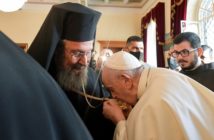Source: Houston Chronicle
Non-priests should be given role when Catholic bishops are accused of scandals.
This week’s meeting of American bishops in Baltimore offers an important test of whether the Roman Catholic Church is prepared to do what’s necessary to restore the hemorrhaging credibility of its priests and prelates.
The assembled bishops will vote Thursday on rules for implementing new directives by Pope Francis. Among other changes, the pope’s decree requires all instances of child sex abuse be reported to the Vatican and to local police. Allegations that bishops have covered up accusations or mishandled investigations of priests will also be reported to Rome. Francis has decreed that other bishops will help evaluate claims against sitting bishops.
These requirements reflect a bitter truth, as Francis has acknowledged.
“The church’s credibility has been seriously undercut and diminished by these sins and crimes, but even more by the efforts made to deny or conceal them,” Francis wrote to the bishops in January.
The new rules are both wise and long overdue. But they’re not enough. The bishops must look beyond the question of their own prerogatives and invite lay members of the church — those who aren’t members of the clergy — to play significant oversight roles. Only then can they ensure that bishops no longer have the final and only voice when it comes to how to handle allegations against themselves or other priests and church leaders.
Bishops are not used to sharing power. Church law makes them supreme leaders within their own dioceses. But Francis has also called on the church to rethink the role of laypersons, especially when it comes to decisions about sex abuse. His decree from May does not require local bishops to involve laypersons as advisers or overseers when it comes to abuse allegations. But it certainly gives them permission to do so.
Bishops should take the opportunity. This week, they should ensure that when allegations are made, the church will benefit from the advice of individuals who have not sworn vows of obedience. That’s precisely the kind of “bold” response Houston’s Cardinal Daniel DiNardo, who is presiding over this week’s meeting, has urged his brother bishops to take.
Good advice, from which DiNardo himself could have benefited.
Even as he’s called repeatedly for transparency, he’s lately been accused of several significant failings. First, police and prosecutors investigating an abuse allegation raided church offices in November and found a trove of documents they should have already been turned over by the archdiocese. Over the weekend, the Associated Press reported a woman’s claims that she was lured into an affair with Monsignor Frank Rossi, who continued to hear her confession. She said DiNardo protected rather than punished him. The story alleged that DiNardo also failed to adequately report two incidents of sex abuse involving children. DiNardo has denied wrongdoing. He’d have a hard time denying this: A lay advisory board, one that is made privy to all allegations of misconduct by bishops or priests, could have helped air these questions long before they became scandals.
It’s the urgency of addressing these allegations that church leaders don’t get, says Michael Morris with the Houston chapter of SNAP, the network of abuse survivors championing reforms and accountability.
“They are concerned about sex abuse; they are not evil,” Morris told the editorial board. “But their first priority is to protect the church. Their second priority is to end sex abuse within it.”
Is that still the case? Or have bishops finally accepted that they must change, that they must give up some power and introduce a few checks and balances into a system that has grievously failed victims for decades and likely centuries?
We hope they choose protecting their flocks over protecting their power. Bishops must appoint laypersons to help them do the jobs they have so often failed to do: investigate abuse, end the cover up, report the findings — no matter the cost.



